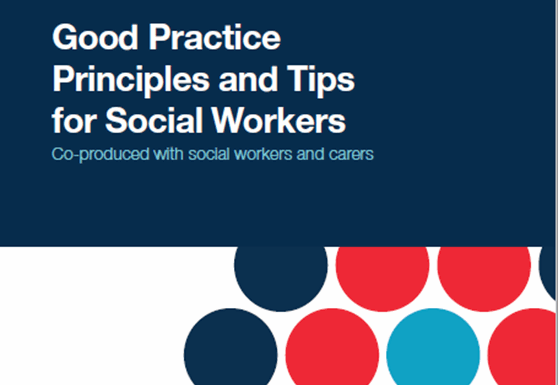The relationship between social workers and unpaid carers is key for the care of vulnerable people and the carers themselves. Carers rely on you as a social worker being an ally to them and lean on your expertise around their rights, the support that may be available to them and how they have have a life/care balance.
Unpaid carers rights are enshrined in the Social Services and Well-Being (Wales) Act 2014. Here is a short video overviewing the rights carers have under this Act.
The Good Practice Principles and tips
Building on what carers and social workers told us in the focus groups, we have developed tips for daily practice. These are grouped into various subject headings for ease of reference:
- Building relationships
- Preparation
- During conversations/the assessment
- Transition from children to adult services
- Hospital Discharge
- Preparing for End of Life
In working with unpaid carers, social workers will be:
- Aware of the legal framework, including the rights of carers in Wales to assessment and support as contained within the Social Services and Wellbeing Act 2014 (the Act) and other policies including the Welsh Government’s national priorities for carers
- Confident about what Carers’ Needs Assessments (What Matters Conversations) should include, why they are worthwhile and what support can be provided following assessment using a person-centred approach
- Engaged and eager to learn about a carer’s situation without preconceived notions or assumptions and seek to understand things from the carer’s perspective as every caring situation is unique. This includes recognising the carer’s expertise in relation to the person they care for
- Supportive and empowering of carers to exercise voice and control by meaningfully taking account of their preferences and opinions when planning support
- Understanding that a carer’s needs and responsibilities fluctuate
- Openminded and proactive in identifying ways for carers to improve how they manage their caring responsibilities. Consider the health and safety aspects of the carer’s role in the context of paid care worker requirements
- Knowledgeable about the different agencies and services that support a carer and, where appropriate, share information with them
to avoid the carer having to re-explain their situation - Supportive of carers to use information and resources provided including contacting services signposted to
- Culturally aware and have an understanding of how cultural factors shape attitudes to caring responsibilities and the appropriateness of services. Make sure that you actively offer welsh language and where necessary other languages of preferred choice
- Disability aware and avoid making assumptions about a disabled person’s ability and capacity if they are part of the conversation
- Clear and reassuring in how they communicate with carers, including keeping in touch in a timely manner
- Proactive in notifying a carer of any staff changes as soon as possible to ensure there is consistency in contacts
- Mindful of the ramifications of decision-making and how this may impact on a carer. Be transparent about how decisions are made and provide feedback
Building relationships is key to
developing mutual trust and confidence
between a social worker and carer.
Below are some important elements to
consider before, during and after your
conversations with a carer.
Under the Act, an information, advice and
assistance service has been set up across all local authorities in Wales. The service MUST promote early intervention and prevention to ensure that people of all ages, including carers, can be better supported to achieve their personal outcomes by exploring options for meeting their care and any support needs. In addition to this, the Act included a carers’ right to assessment.
- Local authorities MUST offer an assessment to ANY carer WHERE IT APPEARS to the authority that the carers may have needs for support
- The duty to assess a carer’s needs is irrespective of the level of support the carer needs or the financial resources they have or the financial resources of the person needing care
- The carers’ needs assessment MUST include an assessment of the extent to which the carer is ABLE and WILLING to provide (and continue providing) the care
- The assessment MUST consider the outcomes the carer wishes to achieve
- If the child is a carer the assessment must assess the outcomes that the people with parenting responsibility for the child carer wish to achieve for the child. For children, an assessment must have due regard to their developmental needs and the extent to which it is appropriate to provide care
- Carers should receive an appropriate and proportionate assessment of their needs. The assessment must follow core statutory obligations, but the process should be flexible and adaptable and consider the main principles of the Act and include:
- an emphasis on promoting well-being
- a preventative approach
- ensure that the individual has voice and control
- a process where you work and engage with carers in a co-productive approach
- Understand the urgency of your conversation with a carer. There should be screening at the initial contact to determine how urgently the carer needs supporting, including a carer’s needs assessment
- If there is background information about
the carer’s situation including the conditions of the person they look after, it is helpful to read this before having a conversation or meeting. Check to see whether the person has made any previous contact and if the person they care for has now or previously had a care plan in place. This may give you some key information and will save the carer from repeating themselves, including any communication preferences for the carer - Help carers to prepare in advance of conversations. In particular, the assessment process can be intimidating and worrying for a carer. Having a clear understanding of what an assessment can lead to and why they are worthwhile will help you explain the process and reassure the carer about what the assessment entails and possible outcomes
- Ask the carer to consider their caring role and think about all the aspects of care they undertake and what constitutes a good and a bad day
- Consider the method of communication you will use (including active offer of welsh and other languages of preferred choice, face to face, over the phone etc) and whether there needs to be alternative ways to communicate such as BSL, Voice to text, Easy Read or a meeting place that is accessible for a disabled person
- Ask the carer what time is best for them and where they want the conversation or assessment to take place. Often carers will not want to have a conversation in front of the person they look after
- Ask whether the carer wants an assessment in their own right rather than combined with the person they care for. This is a right that carers have in the Act
- Make sure that there is adequate time. If necessary, do an assessment over a number of appointments. This could help carers not feel overloaded with information.
- Ensure that you ‘actively offer’ the Welsh Language. It may be that a carer prefers to communicate in Welsh
- Even if there are challenges with regards to what you think you can offer a carer, have a positive attitude. If you do, the carer will relate better to you and are more likely to have a positive outcome
- Keep things simple. Some carers will not understand jargon and may not have the confidence to question what something means. Keep things simple and explain things in layman’s terms
- Be aware that when you visit, the carer may be extremely tired and/or stressed and may have had a few sleepless nights
- You may not be the first social worker the carer/loved one has seen – this could mean very high expectations that are difficult to fulfil; or it could mean they are angry, frustrated or simply jaded. This means your communication must be open and honest, even if you have a difficult message to
- Try not to lead with paperwork as this can be overly formal and intimidating for the carer
- Be led by the carer, remember they are the experts in the care of the person they look after
- Ensure that you take a person-centred approach and ask open and engaging questions
- Make sure you actively listen to what is being said and do not make judgements.
- Ensure that you maintain a positive attitude and ensure you listen carefully to the carer. Find out what the carer wants to achieve in relation to their personal and well-being outcomes
- Understand what their caring responsibilities are like on ‘bad’ days, but also what hopes and aspirations they have
- Explore the carer’s willingness and their ability to care or ability to continue to care (this is not necessarily related to the level of physical care provided but the way that caring affects their whole life must be considered).
- Acknowledge the complexities of caring and explore more fully the carer’s whole role, including their physical/mental and emotional state, how often certain tasks are undertaken and how long they take
- If a carer works, explore if they are struggling with balancing work and care. Have they reduced working hours? If they are not working, do they want to return to work? Are they in education or do they want to undertake any training or education?
- Consider the carer’s finances. Are they struggling financially, do they need expert financial and welfare benefit help? Are
the carer’s housing and living conditions suitable? Are there any specific religious or cultural needs, language barriers, or disability needs that should be considered? - Carers need, at the assessment stage, to be fully informed, prepared and properly equipped for their personal caring responsibility. At the very minimum, carers need to have an emergency contingency plan in place
- Be honest about what can and can’t be provided in terms of support and why. Carers appreciate honest and realistic conversations
- Keep in touch in a timely manner and let the carer know when you will be back in touch. Carers get frustrated if they receive little or no communication or updates
- Ensure you give carers a summary of the conversation and ensure that the carer agrees with your assessment of their situation
- Be honest and transparent in relation to the outcome of any assessment and the conclusions reached as soon as possible
- Make sure that the carer knows what the next steps are including how and when the carer will receive feedback. If you have referred them on to a service, follow up with the carer in a timely manner to find out what the outcome was and if their needs were met. If the needs were not met, consider other ways to meet those needs
- Let the carer know if you are going to
be absent or if there will be a change in personnel, so they know who to contact if they have a query
Transition from children to adult services can be a difficult time for parent carers and their children. Below are some tips to help the process run smoother and help alleviate some of the frustrations and perceived barriers that families face.
- Get to know families, build trust and have conversations as early as possible
- Take a person-centred approach and allow young people and their families to be involved in the process
- Help the family understand the process and help them with the different agencies that may be involved
- Listen to what the young person and the family want
- Allow the young person and the family to be involved in the planning process.
- Explain what is going to happen and when
- Where possible, lead any multi-agency group to develop the services around the young person and the family
- Be honest and transparent
- Keep the young person and family up-to-date with what is happening
- Keep staff consistent and where this is not possible ensure case records are up-to-date
- Support the young person and family to achieve their goals and outcomes
For many carers, if the person they care for is in hospital they may be faced with important decisions. They may be considering taking on a caring role for the first time or may have already been caring for the person but their needs may have changed or increased.
Carers have a choice whether they are willing and able to care or the extent of the care they may wish to give. If it appears that a carer may have a need for support, they are legally entitled to a carers’ needs assessment before or anytime after they take on the caring role.
- Be ‘Carer Aware’ and ensure that if there is a carer or there is likely to be a carer that they are identified and involved at the outset in the discharge planning process
- Make sure you tell the carer about any local carers services or those that may be integrated within the hospital
- Treat carers as equal partners in care, value any contribution they may be willing to make and do not take it for granted that they can and will care
- Avoid using jargon when speaking to the carer, especially in relation to medical conditions. Explain things fully and answer any questions the carer may have openly and honestly
- Ensure when planning discharge that
you have a conversation with the carer at the outset and explain to them their legal entitlement to a carer’s needs assessment and how to access the assessment - Make sure that you let the carer know that they should be a key part of the discharge planning process and have a voice and a say in what happens
- Be mindful that if the person’s condition is new to the carer that you explain fully what sorts of tasks the carer may need to help the person with avoiding using medical jargon
- If the person’s condition has deteriorated or have developed other debilitating conditions, ensure that you have a conversation with the carer to explain in advance so that they know what to expect
- Help the carer understand what support they may need in advance so that they can discuss it with the social worker or other members of the multi-disciplinary team prior to discharge
- Make sure that all support is put in place well in advance of the discharge, including care plans, adaptations, equipment etc.
- If the carer has not received a carer’s needs assessment or a support package is not in place on the day of discharge, think carefully about whether the discharge is safe for the carer and the patient
- If the patient is entitled to reablement services, ensure that the carer understands what this means in practice and what to expect and when
- Make sure that you communicate with
the carer when discharge is imminent and ensure that the day and time of discharge suits the carer - Make sure that you talk to the carer about the method of transport and what will happen on the day of discharge
- Ensure that the carer’s GP is kept informed and that any medication is dispensed and that the carer understands the prescription
- Make sure that you communicate effectively, honestly and transparently with the carer at all times throughout the process
When caring for someone who is nearing end of life there are many considerations to consider before and after bereavement. Carers may need help with end of life care planning and support during the process.
They may also need help after bereavement with the practicalities and coping with the loss.
- Check how the carer is feeling and coping
- Check how many other people are, or wish to be, involved in caring for the person who is dying
- Treat each situation and each carer individually in a way that is sensitive to their beliefs and needs
- Offer a Carer’s Needs Assessment with regular reviews as the person they are caring for deteriorates
- Use the principles of patient and carer dignity, respect, choice and control
- Check which other agencies, if any, are involved in the palliative care package and work with them
- Ensure that care and support is available when needed and provided at home if that is the preference of both the person who is dying and their carer
- Check what information the carer knows already and fill in any gaps
- Consider advance care planning so the person’s wishes and the carer’s feelings for end-of-life care are taken into account
- Check people have understood what you’ve said and back it up with booklets and leaflets about where to get help so they can refer back to it




